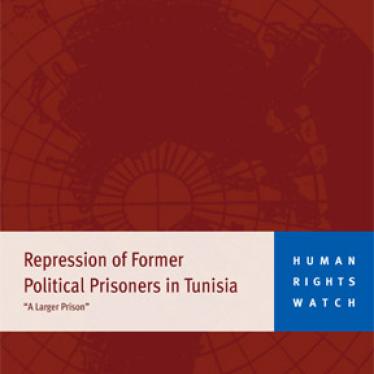(New York) - The Tunisian authorities should end arbitrary restrictions on released political prisoners, Human Rights Watch said in a report released today. The measures seem aimed to ensuring that dissidents are unable to resume normal lives upon release, Human Rights Watch said.
The Tunisian authorities said they would not allow Human Rights Watch to release the report at a news conference, but did not present any legal basis for the decision. Human Rights Watch planned to proceed with the public release on March 24, 1010. Human Rights Watch held news conferences in Tunisia in 2004 and 2005. In the past year, Human Rights Watch has held numerous news conferences in the region, including in Bahrain, Egypt, Israel, Jordan, Kuwait, Lebanon, Libya, Morocco, the United Arab Emirates, and Yemen.
"When Tunisia releases political prisoners, it ensures that life resembles a larger prison defined by surveillance, threats, and a cocktail of restrictions," said Sarah Leah Whitson, Middle East and North Africa director at Human Rights Watch. "The government's attempts to silence Human Rights Watch reflect another element of the repression that is a fact of life for too many Tunisians."
The 42-page report, "A Larger Prison: Repression of former political prisoners in Tunisia," documents the range of repressive measures, many of them arbitrary, that Tunisian authorities impose on former prisoners. These include close monitoring and surveillance, denial of passports, threats to re-arrest some who speak out on human rights or politics, and restrictions on movement that are not delivered in writing to the affected person and the violation of which can lead to re-imprisonment.
Many of these measures appear to be imposed at the whim of officials, without any legal basis. Courts do sometimes legally impose "supplementary sentences" of "administrative control" when they send defendants to prison. According to Tunisian law, during a term of "administrative control," authorities may designate the address where a released prisoner is to reside. However, the authorities often go beyond the law by requiring ex-prisoners to sign in with the police and arresting them for violations of rules that were never conveyed to the prisoners in writing.
"The Tunisian government makes it impossible for former prisoners to lead normal lives," Whitson said. "Instead it should embrace rehabilitation and reintegration policies post-release."
The overwhelming majority of current and former political prisoners in Tunisia were convicted for nonviolent offenses related to Islamist organizations or causes.
The arbitrary repression facing former political prisoners is exemplified by the refusal by authorities to issue passports to the vast majority of them - whether or not they are under administrative control. Some ex-prisoners have been waiting for over a decade since submitting a passport application and have either been refused or received no answer at all.
Tunisia claims that a citizen wronged by the administration can seek relief from an administrative court. But as the report shows, even when this tribunal rules that the authorities wrongly denied a passport to an ex-prisoner, they have persisted in refusing to issue one. In addition to the sample of cases provided in the report, Human Rights Watch has put profiles of additional ex-prisoners deprived of their passports online.
Police often keep former prisoners under close and visible surveillance, questioning relatives and neighbors about their movements, and enforcing restrictions that make it hard for ex-prisoners to find employment. The result for many ex-detainees and their families is impoverishment, and for some, a sense of having become social pariahs.
"Tunisia seems to be saying, we will crush those who were not broken in prison," said Whitson.
Human Rights Watch urged the Tunisian government to:
- provide all former prisoners with a written description of any and all restrictions on their liberties pursuant to Tunisian law, and to allow them otherwise the full exercise of their freedom of movement and all other human rights;
- issue a valid passport to all applicants or provide the applicant in writing with the substantive grounds and legal basis for a refusal, and respect rulings by administrative courts when they rule a passport application has been wrongfully denied.
- publicly issue instructions that no police agent may go beyond enforcing those restrictions on former prisoners that are sanctioned by the law and imposed by the court and provided to them in writing;
- establish a mechanism to investigate complaints by former prisoners about arbitrary restrictions on their rights, and, when warranted, to hold accountable police agents who infringe on their rights and provide compensation to former prisoners for any damage or injury suffered as a result of arbitrary or illegal acts.







